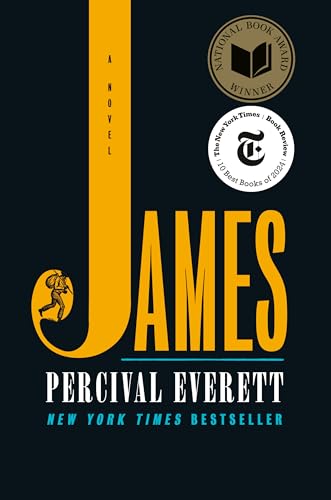James: A Novel

“Everett’s genius in James is that he keeps Twain’s essential plot along with Huck’s fundamental innocence and decency, but he adds his own nuances along the way.”
Percival Everett’s pitch-perfect new novel James is not a retelling of Twain’s Adventures of Huckleberry Finn but rather, as he has said in interviews, it is an opportunity for Jim to tell his story. Everett altered the time frame of Twain’s tale of Huck and Jim from the 1830s to the beginning of the Civil War, a change Everett said he needed to shape a plot allowing his main character a plausible way of imagining freedom for himself and his family.
Like many of Everett’s previous novels, James is about how language and storytelling are connected to race. In many respects, James is a book about the power of language to enslave or to emancipate. From the outset, the narrator, James, mixes the minstrel idiom reminiscent of Jim in Twain’s Adventures of Huckleberry Finn with his real language, that of a self-educated man who has taught himself to read and write at the risk of torture and death. It is a chronicle that recalls the well-known struggle of Frederick Douglass to educate himself. It is the narrative of many voiceless and enslaved Americans whose stories never had the chance to be told.
James teaches his daughter Lizzie how to be “fluent in a language no white person could master.” He instructs her on how to speak to Miss Watson—“Lizzie cleared her throat. ‘Miss Watson, dat some cone bread lak I neva before et.’” And James tells his daughter—“Try ‘dat be . . . That would be the correct incorrect grammar.”
When Huck asks Jim who taught him to do all the things he is able to do, he slips and says, “Necessity.” But he quickly reverts to his role playing: “’Cessity,’ I corrected myself. “Cessity is when you gots to do sumptin’ or else.’”
As James makes clear, for a slave “Safe movement through the world depended on mastery of language, fluency.” Language is an essential measure of the slave filter. Language is a crucial part of the necessary dance steps required for survival. Mark Twain’s Adventures of Huckleberry Finn was centered upon the perceptions and character of the young Huck. Everett’s genius in James is that he keeps Twain’s essential plot along with Huck’s fundamental innocence and decency, but he adds his own nuances along the way. Most significantly, it is James’s story, one that is brutally compelling, eloquent, courageous, and ultimately a magnificently surprising re-invention of one of the great American novels, a reinvention of the American story.
James finds his freedom in language, in stories and the imagination. He reads Voltaire and determines he is not a victim but a rebel. Whites, he decides, are not his oppressors but his enemies. And with a stolen stub of wood and graphite (a theft that causes a man’s death), James says, “With my pencil, I wrote myself into being.” For James, language is the most powerful weapon. As he says after speaking in his true voice to Judge Thatcher, “I had never seen a white man filled with such fear. The remarkable truth, however, was that it was not the pistol, but my language, the fact that I didn’t conform to his expectations, that I could read, that had so disturbed and frightened him.”
James goes far beyond an homage to Adventures of Huckleberry Finn. Everett creates his own American masterpiece, filled with its particular brand of shocking absurdities and cruelties. Everett builds his own polished hall of mirrors with minstrel shows and Blacks passing as whites and Blacks blackening their faces to pass as blacks passing as whites playing blacks. Everett outmaneuvers even Twain in Pudd’nhead Wilson with his satirical sleights of hands here.
Everett’s James, not Huck, is the hero of this story. He loves Huck deeply, and he is the one to free the boy, not the other way around as it is in Twain’s 19th century take on race and compassion. For those readers who think they know what James will be about because they are familiar with Adventures of Huckleberry Finn, they will be stunned to learn that there are revelations in store for them, that Everett’s novel is not merely a companion to Twain’s but a masterwork of its own.